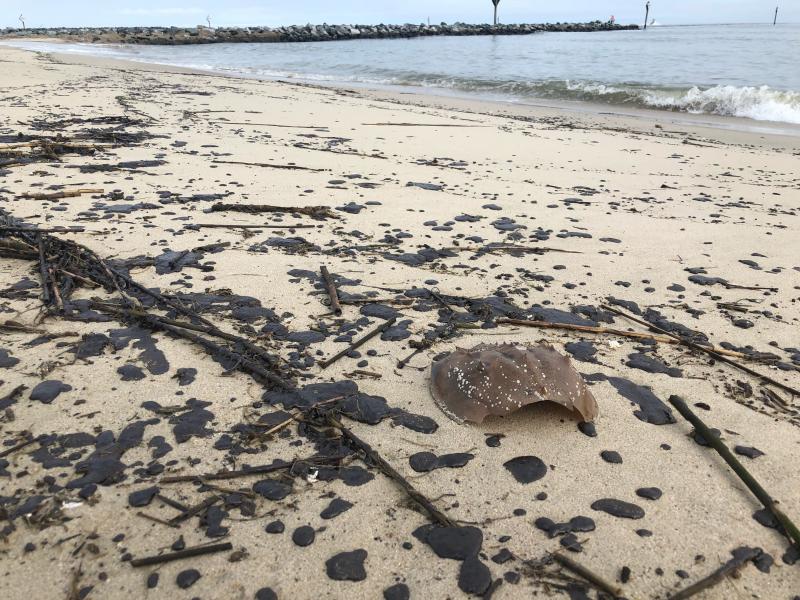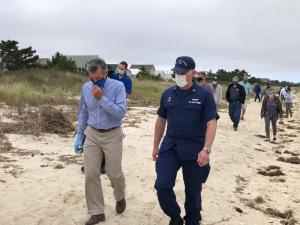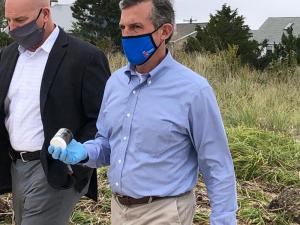The cleanup of an oil spill from an unknown source continues Oct. 26, one week after oil patties first washed ashore on Broadkill Beach and began migrating to other Delaware beaches on both the Delaware Bay and the Atlantic Coast.
About 55 tons – enough to fill four construction dumpsters – had been successfully recovered through Sunday afternoon under the management of the unified command consisting of the U.S. Coast Guard and Delaware Department of Natural Resources and Environmental Control.
“The job of removing oil from our beaches is challenging and labor-intensive, but we’re making progress,” said DNREC Secretary Shawn Garvin. “Our teams are getting more and more of it off our beaches every hour, every day.”
More than 100 personnel have been engaged in the cleanup operation daily over most of the last week, working where needed along the Delaware coastline. Surveys over the weekend found small globs of oil and oily debris scattered from Slaughter Beach to the north side of the Indian River Inlet. An information advisory originally issued for bay beaches last week was extended to some ocean beaches, to include the following areas: Slaughter Beach, Fowler Beach, Prime Hook Beach, Broadkill Beach, Lewes, Cape Henlopen State Park, Rehoboth Beach, Dewey Beach and the Indian River Inlet.
Lewes and Dewey Beach closed their beaches temporarily due to the oil that washed up on shore, some of it settling into a gravel-like substance known as tar balls. Signs have been posted by local authorities at beach crossovers and on dune fences informing the public to avoid the oil patties and tar balls at the water’s edge, and about area closures. The 4-wheel-drive surf-fishing crossing at Delaware Beach Plum Island Nature Preserve, overseen by Delaware State Parks, also remains closed so cleanup operations will not be hampered by vehicles tracking oil onto the sand.
In an Oct. 26 eblast to residents, Dewey Beach Mayor Dale Cooke said areas from Henlopen to Rehoboth Beach seem to be experiencing significant deposits, whereas the Dewey shoreline has somewhat less oil-covered debris. Most of the problem has been deposits along the high tide line, he said, with large amounts of oily ocean straw/grass and small tarballs.
Deposits so far appear to be heavy fuel oil, Cooke said, but the Coast Guard is still testing the debris and sampling vessels’ cargo and fuel. Cooke said when the Coast Guard knows the exact nature of the substance, they believe they will be able to track the source.
The beach is officially closed, Cooke said, but since it is fall, there are no lifeguards, and area beaches are open to the north and south, there is no way to keep visitors from accessing the beach. He asked everyone to stay clear of the beach areas until the debris is completely removed. There is no definitive timetable for the completion of the cleanup, Cooke said.
“If/when the wind comes from the east, crews worry that additional oily debris (if it exists) might be again pushed onto the shorelines,” he said. “The state and Coast Guard will continue their aggressive cleanup work until they are satisfied that the emergency has been abated.”
“Our crews and technology are yielding positive results,” said Lt. Cmdr. Fredrick Pugh, federal incident commander for the response. “We're seeing a lot of this pollutant coming off of our beaches by the ton, and that feels like a high level of productivity, but we're not letting up. These communities need their beaches back.”
The unified command received additional reports of oiled birds, totaling 66 to date. Tri-State Bird Rescue & Research of Newark is investigating the reports and treating wildlife that have been oiled in the water.
Capt. Jonathan Theel of the U.S. Coast Guard said while the spill will take another week to finish cleaning, fortunately, the impact to marine wildlife has not been as bad as it could have been. Theel said those responsible for the spill could face prosecution and/or fines.
Gov. John Carney toured the Coast Guard’s command center for the cleanup effort on Slaughter Beach Oct. 23. Holding a jar of oiled cleaned up from Delaware’s beaches, Carney held a beach-side press conference with Garvin and Theel.
“It’s a reminder of our precious environment here, and the vulnerability of it. This is a small-scale reminder, but you can see what the negative impacts would be on these communities, on our natural environment and our economy,” Carney said. “In the scheme of things, it’s not a really big spill, but still, 20-some miles of coastline were affected. It’s a constant reminder that our natural environment needs to be protected.”
While the oil spill cleanup continues, the Coast Guard and DNREC strongly advise the public not to handle any oily product found or attempt to assist affected wildlife along the shore, but to report these findings to DNREC's environmental hotline at 800-662-8802 so the situations can be addressed by hazmat-trained professionals.
Ryan Mavity and Ellen Driscoll contributed to this report.
Nick Roth is the news editor. He has been with the Cape Gazette since 2012, previously covering town beats in Milton and Lewes. In addition to serving on the editorial board and handling page layout, Nick is responsible for the weekly Delaware History in Photographs feature and enjoys writing stories about the Cape Region’s history. Prior to the Cape Gazette, Nick worked for the Delmarva Media Group, including the Delaware Wave, Delaware Coast Press and Salisbury Daily Times. He also contributed to The News Journal. Originally from Boyertown, Pa., Nick attended Shippensburg University in central Pennsylvania, graduating in 2007 with a bachelor’s degree in journalism. He’s won several MDDC awards during his career for both writing and photography. In his free time, he enjoys golfing, going to the beach with his family and cheering for Philadelphia sports teams.























































